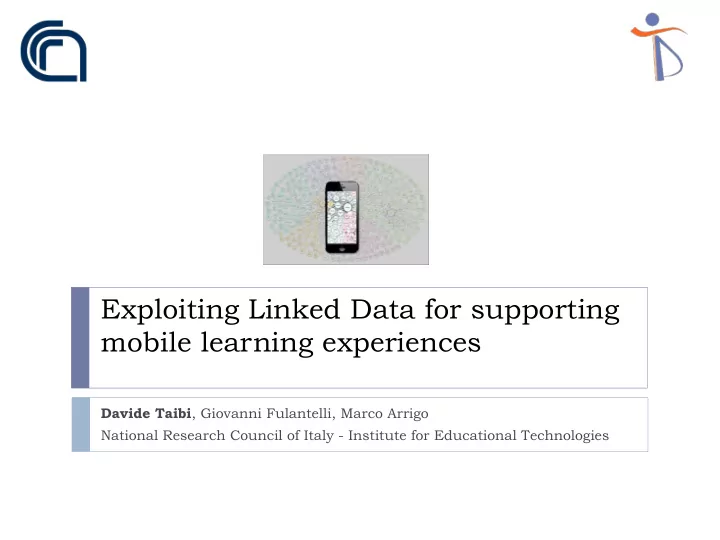

Exploiting Linked Data for supporting mobile learning experiences Davide Taibi , Giovanni Fulantelli, Marco Arrigo National Research Council of Italy - Institute for Educational Technologies
Linked Data for Education Projects The Lucero project LinkedUp challenge LD for Applications inititives LinkedLearning Education MeLOD conferences Globe-T own Datasets
Introduction What is MeLOD? } The MeLOD environment has been designed to support, through the use of mobile devices, the informal learning experiences that take place during the visit of a city T echnological substrate } MeLOD exploits recent advancements in Semantic Web and Linked Open Data to support mobile learning experiences
The MeLOD environment RDF Triple store Analytic dashboard mobile app
MeLOD Web Services Geo-located information Authentication Social learning and activities configuration Web Services
WS:User Authentication and personalization • Dbpedia Language Localization • Dbpedia Categories (e.g. Education, Topic Geography, History, Arts, Life, …) • only text Media • text and images Type • multimedia
WS: Providing geolocated Learning Material MeLOD interlinks the DBpedia, Europeana and GeoNames datasets providing users with localized information by using the DBpedia internationalization features. Learning content for mobile learning activities are usually prepared in advance by teachers and maintained during the whole lifespan of the application. MeLOD exploits the huge amount of dataset in the Linked Open Data (LOD) cloud to overcome these issues, by providing contextualized updated information based on students’ location that are continuously updated.
WS: Social Learners activities } The social activities of voting and commenting performed by students during a visit of the city are central to the pedagogical models behind MeLOD. } MeLOD provides the possibility of enriching the learner’s profile, considering: } the places s/he has visited, } information about her/his learning interests, } information which is inferred by analyzing the cultural heritage sites s/he has visited
MeLOD mobile app 1. Login . Users have to insert their username and password to access the MeLOD environment.
MeLOD mobile app 2. Setting preferences Students can select language, preferred media format and categories.
MeLOD mobile app 3. Browse the Map By clicking on the “Map Menu” the point of interests (POI) near the position of the user will be shown.
MeLOD mobile app 4. Browse Categories a list of categories related to the point of interests (POI) near the position of the user will be shown.
MeLOD Ontology User Configuration Session SocialActivity Track • this class is • this class • this class • This class • This class is used to represents the represents the represents the used to store identify users configuration learning social activities the within the parameters for session performed by information MeLOD each user in associated to the Users. In connected environment . the system, the Users. For this version of with all the Properties: storing each User the MeLOD activities name, information there will be environment, carried out by surname, email, related to more sessions. the two social the Users. … users activities of preferences voting and such as: commenting preferred have been language, represented. topics and media type http://melod.pa.itd.cnr.it/ontology/
MeLOD Ontology
MeLOD dashboard Dashboard: - Plug-in based approach - Providing visualization tools for helping teachers in monitoring the activities.
MeLOD dashboard • A bar charts representing the number of actions performed by each student. • A pie chart representing the percentage of actions performed by each student • A pie chart providing hints about the How students participate to each activity? Which activities are more preferred by participation of the each student? students to the activities under What are the most used activities by the whole class? investigation by the teacher.
Known issues } MeLOD environment integrates several information coming from different datasets. The development of such a kind of application is not problem free! } The prototype we have developed is usable and can be experienced for testing purposes, but the creation of a real world application needs more requirements in terms of response time, results accuracy, implemented functionality.
Conclusion MeLOD combines the results of four research fields: Mobile Learning applications, allowing users to study Learning Analitycs, everytime and providing specific everywhere, tools to analyse supporting formal and students’ activities. informal learning contexts Semantic web, Application and including function exploitations of the mechanisms which are Linked Open Data typical of the new approaches. vision of the Web.
Thanks for your attention davide.taibi@itd.cnr.it http://melod.pa.itd.cnr.it/
Recommend
More recommend